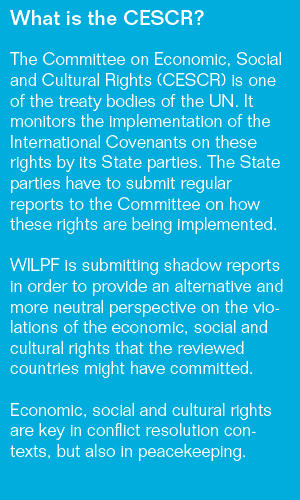 From 6-24 June 2016, The International Covenant on Economic, Social and Cultural Rights reviewed the following countries: Angola, Burkina Faso, France, Honduras, Sweden, The former Yugoslav Republic of Macedonia, and United Kingdom of Great Britain and Northern Ireland.
From 6-24 June 2016, The International Covenant on Economic, Social and Cultural Rights reviewed the following countries: Angola, Burkina Faso, France, Honduras, Sweden, The former Yugoslav Republic of Macedonia, and United Kingdom of Great Britain and Northern Ireland.
WILPF handed in shadow reports on France, Sweden, and United Kingdom of Great Britain and Northern Ireland. These three reports were focusing on the impact of exports of explosive weapons to Saudi Arabia or its allies on the right to health, education and adequate housing of people in Yemen.
In the reports, WILPF denounced the violation of the rights to adequate housing, health and education outside of European territories. We claim that export of arms to Saudi Arabia is violating the rights of Yemenis because Saudi Arabia is indiscriminately striking on Yemen. The health system has now collapsed, schools have closed their doors for months and many have had to leave their homes to escape the conflict. Such exports do not comply with the CESCR and neither with the ATT.
The CESCR Committee has thus reminded the UK to conduct thorough risk assessments prior to granting licences for arms exports and refuse or suspend such licences when there is risk that arms could be used to violate human rights, including economic, social and cultural rights.
This adds to United Nations Secretary General Ban Ki-moon’s request to the United Kingdom to stop its arms exports to Saudi Arabia because of its role in the conflict in Yemen.
The UK and exporting countries are receiving increasing pressure to significantly reduce and control their arms exports as we see devastating consequences in Syria, Yemen, Libya and conflicts all around the world. WILPF was proud to contribute to this pressure to the UK, the 6th arms exporter in the world according to SIPRI.
Regretfully, the Committee did not raise any concerns regarding the export of arms of France and Sweden. One positive point though, the review of Sweden integrated a major gender perspective. When economic, social and cultural rights were mentioned, the situation of women was not forgotten.




